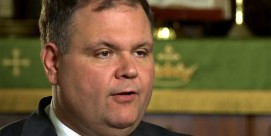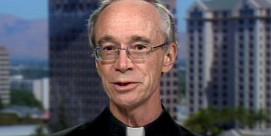In This Episode << SLIDE LEFT TO SEE ADDITIONAL SEGMENTS
Conversation with Anna Greenberg and John Green
Read more of Bob Abernethy’s conversation about the RELIGION & ETHICS NEWSWEEKLY national survey of America’s evangelicals with Anna Greenberg, who directed the survey, and political science professor John Green:
Anna, let’s begin with your finding that, in many ways, evangelicals are not so different from anybody else.
I think one of the most interesting parts about this research is how many characteristics evangelicals share with other Americans. They are slightly more likely to live in the South, but not extremely so. They are slightly more likely to live in rural areas or small towns, but not extremely so. They have pretty high levels of education. Almost as many have a college education as anybody else. They say they’re part of the mainstream, and in many ways, they are part of the mainstream.
But with big differences about what?
The biggest difference is their beliefs and practice. They have very strong and conservative religious beliefs, and they put them into practice at a level of great intensity, compared to anybody else.
But there’s a big tension, isn’t there, John, between this idea, on the one hand, that they feel part of the mainstream, and on the other hand, an uneasiness about their acceptance?
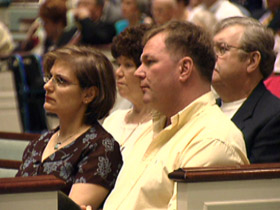
Absolutely. The survey shows that, I think, very clearly. On the one hand, about three quarters of evangelicals really think that they’re in the mainstream of American society, which fits with Anna’s findings about their demography. On the other hand, three quarters of them also think that they have to fight hard to get their point of view across to their fellow Americans. So this is a group that feels in some ways comfortable with American society, but in other respects still estranged and still apart.
They feel that they have to fight to get their point of view across, John, even though the president and the attorney general and leaders of the House and Senate are evangelicals?
Absolutely. You know, one of the interesting findings in the survey was that evangelicals recognize that they have influence with the president, with the White House. But they also feel that the news media is very hostile to them. And about half of them feel that other Americans look down upon them. This is a group that understands that it has a place, but they are not entirely comfortable with that place.
You mentioned, John, that they are not so happy with the mass media.
Not happy at all. Three quarters of white evangelicals also view the media as being hostile to their values and their community.
Anna, one of your impressive findings had to do with the importance of moral values — for evangelicals and for everybody else.
That’s right. I think that we make an assumption that the thing evangelicals care about most [is] the moral values of this country, and that’s true. If you ask them, “What do you care about most?” about a third say the most important issue is moral values. But in fact, there are a lot of other issues that bother them just as much — the economy, retirement, education. So it turns out, when they think about their economic concerns, they’re not all that different than other Americans. When you ask, “What’s your biggest worry?” the thing that comes out is children not learning the right values. In fact, all Americans feel that way. When you ask evangelicals, “How are the moral values of the country going?” the vast majority would say, “The wrong direction.” What’s interesting is that other Americans feel the same way. The difference between the two is that evangelicals act upon it. They vote on it. They make sure they control what kinds of popular culture their kids are exposed to. Americans all share the same concern about moral values, but there’s an impetus among evangelicals to actually do something about it. Other Americans aren’t as likely to say that their view on the moral direction of the country has the same impact on their behavior.
John?
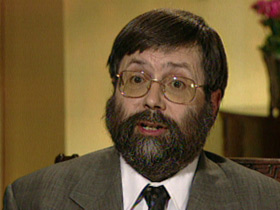
It turns out that Americans overall have some real questions about whether the country is on the right track morally. It’s not just evangelicals. It’s interesting to put the findings that Anna talked about, about their priorities, versus this general sense that we’re on the wrong track morally. Part of what may be going on here is there are different definitions of morality. Evangelicals tend to look at family, children, sexual issues; whereas many other Americans may look at social justice, war and peace, and those types of issues.
And Anna?
Or corporate greed. That moral question actually has a different political implication for evangelicals than it does for other Americans.
John?
Absolutely.
What does this new survey have to say, John, about evangelicals and politics in 2004?
Well, you know, the last couple of years, white evangelicals have been seen as a strong Republican constituency. They voted very heavily for George Bush in 2000, and our survey suggests that that support for Bush is maintained; for instance, we found that 71 percent of white evangelicals said they would vote for Bush over Kerry if the election were held today. There is some question as to what the voter turnout will be, which is important. And at the moment, it looks like voter turnout will be about like other Americans. But of course, it’ll be very important to President Bush to have high turnout from this solid Republican constituency. White evangelicals are clearly a conservative, or Republican, group. But they’re not monolithically so. About 23 percent said they would vote for Kerry, and it’s possible that, under [certain] circumstances, the Democrats might get even a few more votes.
What circumstances?
If social issues come up in the campaign in a way that allows the economic and foreign policy concerns of evangelicals to be relevant to their votes. For some people, the economy is going to be very important. Many evangelicals believe that the country’s on the wrong track economically, very much like their fellow citizens. But for evangelicals, the moral issues seem to take precedence, and that seems to be what ties them to their Republican voting behavior. Many of the evangelical Democrats are pretty fierce Democrats, strongly supportive of their party. It is possible, if the social issues are somewhat on the back burner in this election, that Senator Kerry might even get a few more votes from the evangelical community, because issues like the economy and health care matter to them, as well.
But, Anna, not much chance that those social issues are going to remain anything but of very high importance for evangelicals?
That’s right. I think it’s hard to imagine a different outcome. Another thing that probably stands Bush well with evangelical voters is how they view the world and America in the world. They are very, very supportive of a strong defense. They’re supportive of the war on terrorism. They’re patriotic. They are less supportive of a more multilateral view or interventionist [view] around human rights issues. And to the extent that international issues play a role in this election, which they will, many evangelicals are very strongly supportive of the president. When it comes to their views about the world, white evangelicals are very interested in being strong militarily, very strong on Iraq. And that is, I think, a set of positions that probably favors Bush.
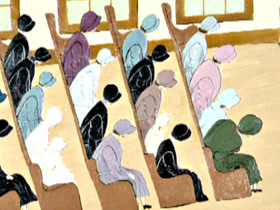
John?
Anna is probably right, although there was another finding that I think may help the Democrats: evangelicals are pretty evenly divided as to whether American society is on the right track or the wrong track.
Are there signs, Anna, that evangelicals are becoming more tolerant?
Well, moral issues shape their worldview in pretty profound ways. But on a series of questions that we might assume in a very simplistic way they will just be knee-jerk, we actually found that they have a nuanced view. If you look at something like the question of gay marriage, the vast majority, 82 percent, are opposed to gay marriage. But if you asked, “Do we need a constitutional amendment, or are state laws sufficient?” only 42 percent say we need to amend the Constitution. I think there was some sense, probably on the right, that this would be sort of a home run with this base group for the Republican Party; but in fact, a majority thinks that the laws are okay. When we asked them, “Would you vote for a candidate who held a different position than you on the question of gay marriage?” only about 47 percent said, “I would vote against that candidate if they had a different view than me.” The rest were okay. It’s not even a litmus test for them. So I’m not sure if they’re becoming more open or tolerant per se, but they certainly have nuanced views about these issues.
And, Anna, how about the religious idea, the theological idea, that only the born again can be saved?
One of the more interesting things we found was that less than a majority, only 48 percent, think that you have to be born again to be saved. There’s a sense of openness, at least to other Christians, and maybe even broader than that, that there isn’t just one way to be saved.
John?
And that’s quite interesting, because the sense is that’s a change — that in the past, evangelicals might have been much more likely to say that only a born-again person can reach heaven.
And how do evangelicals feel, John, about well-known evangelical leaders?
They are not all that supportive of people like Pat Robertson and Jerry Falwell, people many of us associate with white evangelicals. In fact, evangelicals don’t see them particularly as their leaders or in a favorable light. They were more likely to see Franklin Graham or James Dobson, who are more religious leaders than political leaders, in a favorable light. And they see the pope in a very favorable light — in fact, about as favorably as they see their most favorable leaders.
What do you make of that, Anna?
Evangelicals are able to differentiate among their own leadership. And I think it goes to the question about openness and tolerance. Historically there was an assumption that evangelicals are anti-Catholic. The survey results show that that’s not true anymore. There is a broader worldview about other Americans, about other Christians.
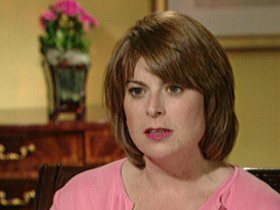
What did you find, Anna, about evangelicals in their own culture and evangelicals in relationship to the larger national culture?
Evangelicals are not cut off from popular culture. They watch TV at the same rates as other Americans. They watch broadcast news. But they also have their own set of media. They have their own books, their own radio, their own television, their own magazines; and they read them at high rates. They don’t view regular media as particularly favorable towards them. They think it’s quite hostile, and so it’s important to them to have their own set of spokespeople. But they consume both [cultures] at the same rates.
John?
On the sense of hostility evangelicals feel from the national news media, it’s not just that the media have different values. There is a real sense of hostility. I think that extends also to popular culture. We asked questions about whether evangelicals permitted their children to watch television or video games, and there was some strong evidence that they restricted the viewing habits of their children. So evangelicals, while they participate in the popular culture, have some very major issues with it.
John, what should the news media do that they’re not doing?
Part of it is, I think, that the news media have not always been sensitive to the evangelical community. At least evangelicals perceive that they’ve been misrepresented and not treated fairly. But also, part of it may be that the news media have a different set of goals, and oftentimes evangelicals disagree with those goals.
Anna?
I do think the lack of sensitivity is important, because it shapes how other Americans see evangelicals. The fact is they’re about 20 to 25 percent of the population. They buy Christian books at numbers that would blow the NEW YORK TIMES best-seller list out of the water. And most nonevangelical Americans don’t even know this about evangelical culture. The media have a big impact on how other people see evangelicals.
What are some of the goals, John, that people in the national news business have that evangelicals don’t like?
Well, evangelicals, of course, have these very strong, traditional moral values, particularly when it comes to families and children and sexual behavior. And of course, many of the people in the national news media perceive those issues very differently. Even if the media meet an objective standard to reporting these issues, many evangelicals will find that objectionable, because their particular values are not being held up.
Anna, what did you find about evangelicals and evangelizing, taking the “good news” of the New Testament into all the world?
Part of being an evangelical is the imperative to proselytize, to evangelize, to convert. We find very strong evidence in the poll that evangelicals do that. They talk to their friends. They talk to their family. They talk to co-workers. Even about a third say they talk to strangers. But even more of them just talk about it informally. I think that’s very important. It doesn’t have to be a deliberate attempt to convert. It can just be spreading the “good news,” talking with friends, talking with family. About 75 percent say on a weekly basis they just talk about these issues.
John?
There is a difference in the survey, though, between sharing one’s faith, talking about one’s faith, and actually trying to convert people. Significantly fewer evangelicals say they actually try to convert people than say they simply share their faith with others.
And evangelical missions, Anna?
Evangelicals support missions at very high levels when you look at what they contribute their money to. There’s a very high level of support for international mission work. Very few — only about 7 percent — say they’ve actually gone on international missions. They like to spread the gospel domestically.
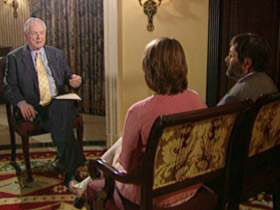
Was there anything that surprised you in the results of the survey, Anna?
What surprised me the most was how part of the mainstream evangelicals are. They watch the same amount of television, they live in the same places, they go to churches of the same size. Everybody worries about moral values. They’re set apart by their religious beliefs and the intensity of their faith. But in many ways, they’re just like anybody else.
And John?
The thing that surprised me most was the stark evidence of the ambivalent feelings evangelicals have toward American society, with three quarters saying that they feel they’re part of the American mainstream and an equal number, three quarters, believing that they have to fight hard to get their point of view across.
The thing that surprised me the most was how not only evangelicals but everybody else felt the country is on the wrong track when it comes to moral values. Anna, any comment on that?
I think that’s right, and we see that in lots of different research that we do. It gets played out in very different ways, whether it’s politics or how people make decisions about their families. I think that’s the key difference between evangelicals and nonevangelicals — how it gets played out in their lives and their political views.
John?
Again, part of what may be going on in that question is a great disagreement in the United States about moral values — some people wanting to emphasize family and children and sexual issues, other people wanting to talk about war and peace, social justice, the regulation of the marketplace. Americans, I think, are revealing that those are very major conflicts today.
Anna?
If you look at African Americans and African-American evangelicals, they’re even more likely than white evangelicals and other people to say the country’s on the wrong track. They hold a very intense set of conservative views about moral issues. What’s interesting about them is that politically they are completely different. The vast majority is going to vote for Kerry. This is an area where moral issues among evangelicals play out very differently. Evangelicals are more concerned about moral values as a stand-alone issue, but it’s true everybody feels that way. The difference is how it ends up playing out in people’s lives and in politics. For evangelicals, these issues influence how they would talk to their children; what they’d let them watch on television, on the Internet; and how they vote.
John?
Moral issues are one of the great divides in the United States today, with different religious communities defining morality in different respects. So, for instance, for African Americans and African-American evangelicals, questions of civil rights and social justice appear to be in the forefront. They regard those as the central moral issues of our times. On the other hand, white evangelicals look at family, sexual issues, children. They see those as the central moral issues of our times. Each of these communities, which are very similar in religious terms, end up quite different politically — one supporting the Democratic Party and the other supporting the Republican Party.


